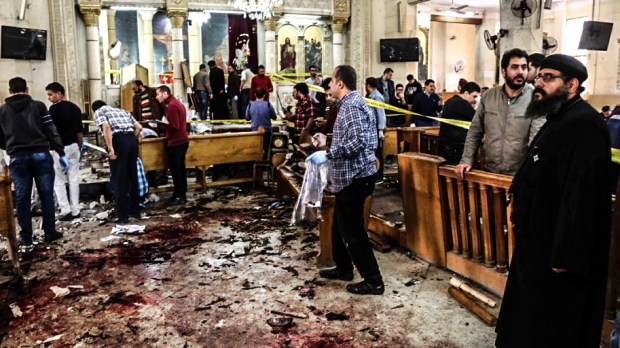After attacking Berlin, London, St. Petersburg and Stockholm, last Palm Sunday ISIS decided to attack Egypt — specifically, two Coptic churches in Alexandria and Tanta. Dimitris Cavouras is a citizen of Alexandria, networks manager at the Anna Lindh Foundation, and a spokesperson for the Greek community of the city. When the attack occurred, he was barely 400 meters away from the Coptic Cathedral of St. Mark.
Why Egypt and why the Copts?
“They didn’t only attack the Coptic community, but also the Egyptian society,” Cavouras told Aleteia. For him, it is no coincidence that the attack had this very specific goal. “The Coptic community is the largest Christian minority in Egypt,” he said, explaining that in Egypt, interfaith relations have gone astray, also because of different geopolitical pressures.
Shrines and places of worship, whatever religion they may be, are a clear goal for terrorists, Cavouras points out. This has been the case since the revolutions of 2011. “Shrines and temples are indeed a weak point, where terrorism can do a lot of damage. In this case, the Copts have paid the highest price.”
But going beyond religious violence, as the spokesperson himself acknowledges, terrorists are looking to intimidate the Egyptian government and threaten the country’s unity. In fact, a few days before the attack, journalist and activist Mustafa Sinjar declared on the website of the Center for Religious Pluralism in the Middle East that “having the Copts as an objective is a measure of pressure, since it has local and international repercussions for the Egyptian regime.” According to Sinjar, ISIS intends to divide Christians and Muslims by attacking the Copts, thus demonstrating “the State cannot defend them.”
What has motivated these attacks right now? “Now two Coptic churches have been attacked, adding up to a great number of both dead and wounded Egyptian Christians,” explains Cavouras. “But this doesn’t mean the situation has exactly gotten worse, as it was already very deteriorated,” he claims.
In fact, on February 24, hundreds of Christians left the city of el-Arish, only 100 kilometers away from Cairo, after the Islamic State sent a threat. Seven citizens had already been killed a few days before, and ISIS issued a video confirming the Coptic community as a target. On February 28, Egyptian President Abdel Fattah al-Sisi declared that such threat was “a cowards’ plan to destabilize the government, break national unity and instigate conflict.”
“We will heal this wound and we will be more united than ever”
A few days after the Palm Sunday attack, the Egyptian citizens are still strongly shocked. “We feel fear, anguish and sadness,” says Cavouras. So far, the government has declared three days of mourning and a 3-month state of emergency, which is the maximum the country’s constitution allows.
In spite of everything, according to the spokesperson of the Greek community in Alexandria, “the Egyptian society is convinced that it will overcome this difficulty, and that it will indeed help us all to stay united and build stronger bonds.” He himself explains how many friends, both Muslim and Christian, called him to know if he was well. Also, people have flooded nearby hospitals in order to donate blood.
Pope Francis, hope for Egypt
According to Dimitris Cavouras, the coming visit of Pope Francis to Egypt will not be affected by the attack. In fact, he assures, “the organizing committee of the event received a message confirming the trip is maintained as planned.”
In this regard, the spokesman stresses the importance of the visit of the Pontiff, on April 28. Although he admits it may be considered a provocation for terrorists, “it is a great symbol of hope and strength for the Coptic community.”

